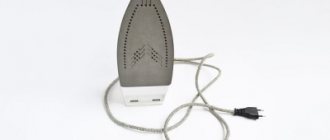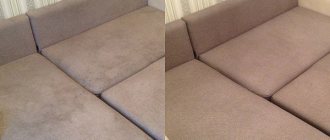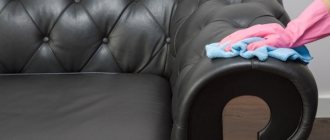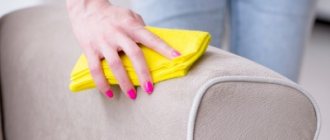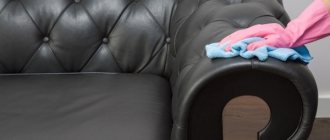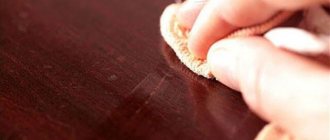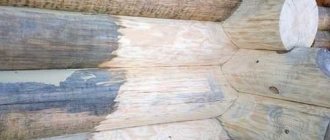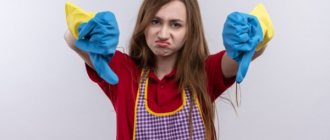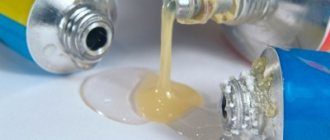Icer
3304 0 0
Icer February 10, 2019Specialization: master in the construction of plasterboard structures, finishing work and laying floor coverings. Installation of door and window units, finishing of facades, installation of electrical, plumbing and heating - I can give detailed advice on all types of work.
A couple of days ago, while making another masterpiece, children left marks on the table in the form of a few drops of super glue. At first I decided that the tabletop was irreparably damaged and I would just have to get used to the stains. But, after reading information from specialists and experienced housewives, I found a number of ways to remove glue. I will tell you about the most effective of them in the review.
Fresh glue should not be spread on the surface. Remove it with any flat device
Important Tips
In order not to aggravate the situation and not complicate your work, remember a few simple tips:
- Do not wipe off drops of fresh composition with a rag or napkin . You will stretch the second glue over the surface and instead of a small drop you will have a large dirty area that is much more difficult to wipe off. Take a toothpick, a piece of construction paper, or something else and carefully pry the droplet to remove it with minimal damage.
- Do not try to remove the glue with your fingers . Anyone who has had similar compounds come into contact with their skin knows how unpleasant it is and how long it takes to scrub their fingers off afterwards. Always use a tissue or something else to remove dirt without getting dirty.
Everything sticks to glue-stained fingers
- The sooner you start work, the better . No need to wait for the surface to dry. When the mass polymerizes, it becomes tens of times stronger and harder. But fresh stains can be removed much easier and faster, and you are almost guaranteed to remove the glue without a trace, which is not always possible if it has dried out and become embedded in the surface.
- It is better to prevent a problem than to fight it . Before starting work, I advise you to cover the tabletop with a rag or newspaper, so that even if the glue spills, you can easily clean it up. You can lay a sheet of paper only on part of the table, this is usually quite enough to glue something together.
Cover the table with paper, and if you spill the composition on the surface, cleaning it up will be as easy as pie
- Try different means . The effectiveness of one or another option depends on a number of circumstances. Therefore, I advise you to start with the simplest solutions that are at hand. And if they do not give the desired effect, then use more potent formulations.
- Always be careful while working . You need to be very careful when cleaning a varnished table, as the coating is easily damaged. To avoid polishing the surface later and re-painting it, do not rub too hard.
- Try chemicals on an inconspicuous area . To make sure that the product you choose does not damage the surface or leave marks on it, drop it on an inconspicuous area and wait a few minutes. If nothing happens, you can use this composition.
Which methods are better not to use?
You can use different methods to remove glue from the table. But at the same time, it is important to carefully approach the choice of a specific active ingredient. In order not to damage the furniture, you need to follow these recommendations:
- You cannot use a substance unless you are absolutely sure how the material will react to it.
- Do not use caustic substances in a closed room. They emit toxic fumes that can cause poisoning.
- Chemicals should not be used to remove glue residues that have come into contact with utensils used for preparing or storing food.
- First you need to use traditional methods that are gentle on the surface of the furniture, and only then move on to the use of more aggressive substances.
- To clean large surfaces, you should always try the selected product on a small area and monitor the reaction of the material for several minutes. To do this, be sure to wipe the surface after using the drug and look at its condition.
When cleaning furniture, it is important to wear rubber gloves. They will prevent irritation and protect the skin from damage. It is especially important to take precautions if you work with caustic compounds.
Available means
To begin with, I will talk about those compounds that are almost always on hand. They may be less effective, but if you are removing fresh stains, then this is quite enough to achieve excellent results.
| Illustration | Description |
| Option #1. Soap solution. Price – from 30 rub. Peculiarities:
| |
| Option #2. Nail polish remover with acetone. Price – from 40 rub. Peculiarities:
| |
| Option #3. Medical alcohol. Price - from 50 rub. Peculiarities:
| |
| Option number 4. Exposure to temperature changes. Price – free. Peculiarities:
| |
| Option #5. Lemon juice. Price – from 30 rub. Peculiarities:
|
Removal features: how to clean fresh stains
Until the layer has completely hardened, scrubbing the surface will be much easier; to implement the idea, you should prepare a solution of water and laundry soap. To quickly dilute a 72% piece, it is first rubbed into small chips, then immersed in hot water and waited until the component softens.
By periodically stirring the homemade product, a person will notice how the liquid begins to acquire a specific shade; when there is no soap left at the bottom, one should begin to wash the surface.
To apply and remove marks, it is better to take a brush with bristles or a regular dishwasher model with a hard side; fresh residues of the adhesive base are removed without excessive effort, so the surface remains in perfect condition, without scratches or other damage.
A solution that is mixed from laundry detergent and water at room temperature is considered no less effective; the disadvantages include the large formation of foam during prolonged rubbing with a rag.
But such excess is minimized as much as possible after using the “automatic” model, designed for pouring into a machine; a product copy is created in such a way that the powder does not lead to the accumulation of a large mass of bubbles.
Both methods will be relevant exclusively on fresh stains; you need to have time to remove the layer before it completely sets; for old marks, you will initially need to soften the structure of the fixing mixture, which soap or powder cannot do.
Special formulations
There are both specialized tools and options that are used for other purposes, but are also suitable in our situation.
| Option number 6. Gasoline or thinner. Price – from 85 rub. Peculiarities:
| |
| Option No. 7. Dimexide. Price – from 100 rub. Peculiarities:
| |
| Option No. 8. Anti-glue. Price – from 140 rub. Peculiarities:
|
Remember that super glue is a cyanoacrylate compound. If the product indicates that it removes such compounds, then it is definitely suitable for you.
Methods for cleaning different surfaces
The adhesive composition may remain on different surfaces during operation. Most often, the furniture on which they work suffers. You can clean the product if you choose the right active substance and do not violate the rules of action.
You can remove glue from wooden tables and other wooden surfaces using nail polish remover. In this case, you need to be careful not to use alcohol or solvents on varnished surfaces. If the furniture is varnished, remove the glue from it with vegetable oil. They cover the stain for several hours, then remove it by mechanical scraping.
Tables made of plastic and glass are cleaned with a regular glass cleaner. After the adhesive layer has softened and the main part has been removed, the residues from the glass or plastic are scraped off with a knife. If superglue drips onto your glasses, remove it with nail polish remover. It is important to ensure that the composition of such a preparation does not include acetone.
To wipe the surface of a monitor, smartphone screen or other similar screens, dimethyl sulfoxide is used for this. Soak a rag in the solution and wipe the stained area with it. Then the remaining dirt is removed with special wipes for cleaning office equipment or just a clean, dry cloth.
Tips from the forums
- Never use cellulose wipes to wipe off fresh glue . The composition reacts with cellulose, causing it to heat up sharply and cause a burn. Plus, the melted mass is very difficult to remove both from the surface and from the skin of the hands.
Do not use cellulose wipes to remove fresh glue, this will further aggravate the problem.
- To remove super glue, use isopropyl alcohol . Sold at hardware stores and works great in most cases. It is used like most products - the surface is moistened and left for a short time. Then it is wiped off with a sponge or soft brush.
Isopropyl alcohol will help quickly and effectively remove dirt from hard surfaces.
- When using solvents, cover the surface . This way they will not evaporate into the air and the effect of use will be much better. Another option is a special paint remover; it is thick and does not need covering.
When using compounds that evaporate quickly, cover the surface with polyethylene.
- Use anti-adhesive with caution . Despite the fact that the packaging states that it is completely safe, at times the surfaces suffer. Therefore, before use, I advise you to apply a drop to an invisible area and leave for at least an hour.
Anti-glue may damage the surface, try it first on an inconspicuous area
- Use acetone when removing composition that has not yet hardened..
Acetone can clean fresh glue quite well.
Basic qualities of superglue
This remedy is often used in everyday life.
It effectively and quickly glues different surfaces. This glue has a liquid consistency. Therefore, it quickly spreads if handled carelessly and sticks to everything it comes into contact with. In particular, it can glue the skin on your hands. Then the problem arises of how to wash off the adhesive composition. The product can restore a damaged item without being noticed. Therefore, it is still popular. Important! When working with superglue, a person’s hands should be protected with gloves and their respiratory organs with a mask or respirator. If this product gets on furniture, it must be wiped off immediately.
After hardening, it is very difficult to wash off traces of such glue. What further complicates the process is that it immediately hardens upon contact with moisture, since there are no moisture-soluble substances among its ingredients. It cannot be used to connect items that contain cellulose. Once applied to an object, superglue begins to generate heat, which can lead to a fire. Therefore, such a substance is not used for paper or clothing.
What to remember
- To remove, use the products you have on hand : soapy water, lemon juice, nail polish remover or alcohol.
- If there is no result, purchase special products . Dimexide is sold in pharmacies and is easier to find; anti-glue is less common.
- Always test the product on an inconspicuous area . Otherwise, instead of a glue stain, a chemical stain may remain.
Did you like the article? Subscribe to our Yandex.Zen channel
February 10, 2022
Furniture
If you want to express gratitude, add a clarification or objection, or ask the author something, add a comment or say thank you!
How to remove super glue from furniture
Superglue hardens quickly and is not easy to remove.
First of all, it is important to prevent such compounds from getting on furniture. If there is a need to glue a damaged decorative part, this must be done with caution. When working with glue, it is better to cover the surface of a table or other interior item with paper so that drops do not fall on them.
The glue is based on cyanoacrylate, which dries very quickly and is difficult to remove. Your task is to dissolve or soften it as much as possible.
To remove glue you may find it useful:
- scotch;
- rags and napkins;
- blade, knife or scraper;
- toothbrush and fine-grained sandpaper;
- hair dryer;
- soap or vegetable oil;
- toothpaste;
- acetone, dimexide, gasoline, white spirit;
- alcohol and vinegar.
Start removing with milder products and only if necessary, move on to strong solvents.
Helpful information
In order to clean furniture from glue efficiently and without consequences, you need to take into account the following tips:
Softened glue is removed only with plastic or wooden means. Metal objects are not suitable for this, as they leave behind scratches.- Gloves are used to protect the skin of the hands.
- Do not leave the compounds on the surface for longer than the specified time.
- After cleaning is completed, the furniture should be treated with a clean, damp cloth.
Furniture care
Furniture should be regularly wiped from dust and protective agents should be applied. They will not allow the glue to penetrate deeply into the pores in case of negligence. Put covers on upholstered furniture that are easy to remove and wash, and in more severe cases, replace with new ones.
Mandatory condition: cover the table with newspaper or paper when working with adhesives. If you are repairing furniture with their help, use a brush that can be used to precisely apply the composition and not stain the surrounding surface.
Pollution is always easier to prevent than to remove.
Use the above cleaning methods if necessary, but try to keep such hassles to a minimum.
